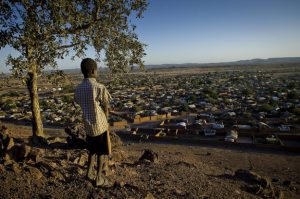
This course can be taken as stand-alone, or as part of the Diploma in Human Rights and Forced Displacement.
Course Description
This certificate course introduces learners to the various dimensions of human rights protection as it applies to Internally Displaced Persons (IDPs). The rise of internal conflicts in the last couple of decades, accompanied with natural disasters in many poorest parts of the world, has led to emergence of more than 27 million IDPs today. It is obvious that their particularly vulnerable situation creates deep inroads into their human rights. This course addresses the international legal principles and guidelines for protection of IDPs, and the operational challenges to their protection and durable solutions. The course is designed to provide a contemporary flavour to the topic using recent and emerging crises situations around the world as case examples. The course begins with an overview of the contexts in which IDPs emerge in today’s world, before addressing the international and regional legal frameworks for the protection of their human rights. The institutional dimension of operational responses is then analyzed by understanding and deconstructing the Cluster Approach, as well as the role of UNHCR in the protection of IDPs. The role of civil society as well as gender dimensions of protection of IDPs is then analyzed. Finally, the course looks at the possible durable solutions and contemporary challenges thereto in the context of IDPs.
This e-learning course is based on a dynamic pedagogy including reading materials, video clips, case studies, and interactive webinars with the instructor as well as officials of UNHCR.
Course Outline
- Week 1. Internally Displaced Persons (IDPs) in today’s world
- Week 2. IDPs and Human Rights: The international and regional legal frameworks
- Week 3. The Cluster Approach, and the role of UNHCR and civil society
- Week 4. Gender dimensions of Protection of IDPs
- Week 5. Durable Solutions
- Week 6. Contemporary challenges to protection of IDPs
Who Should Apply
The course is intended for staff members of NGOs and government agencies advocating for and working on the protection of IDPs, staff of inter-governmental agencies and others interested in these issues. Candidates should have a good written command of English and have high competence and comfort with computer and Internet use.
About the Instructors
Dr. Jan Arno Hessbruegge (Germany) works for the New York Office of the United Nations High Commissioner for Human Rights (OHCHR). Over the last 17 years, he has worked as a legal adviser in the High Commissioner’s Executive Office, in OHCHR’s Rule of Law Section and for the U.N. Commissions of Inquiry on Human Rights in Syria and North Korea. He also served in peacekeeping missions in Sudan and Haiti, and worked with the U.N. Special Rapporteur on Violence against Women and the Representative of the U.N. Secretary-General on Internally Displaced Persons. He holds a law degree from the University of Muenster in Germany, a Master of Law and Diplomacy from the Fletcher School, the Diploma Law of the Hague Academy of International Law and a doctorate in international law from European University Viadrina in Frankfurt (Oder), Germany. He teaches this course in a personal capacity and the views presented are not necessarily those of the U.N.
Dr. Mihir Kanade (India) is the Director of the UPEACE Human Rights Centre and is also the Head of the Department of International Law and Human Rights at UPEACE. His principal area of academic research and study is Human Rights and Globalization, covering several themes within that interface including trade and investment, sustainable development, forced migration, indigenous peoples’ rights, public health, amongst others. He has extensive experience in training staff of inter-governmental, governmental and non-governmental organizations, as well as professionals, in the field of human rights. He acts as an advisor to several human rights organizations and corporations on issues related to human rights and international law. He is also an adjunct faculty at Universidad Alfonso XI El Sabio (Spain), Cheikh Anta Diop University (Senegal), and Long Island University (United States). He has a LL.B from Nagpur University (India) and a Masters degree and PhD from UPEACE. Prior to his pursuit in academia, Mihir practiced for six years as a lawyer in the Bombay High Court and in the Supreme Court of India, focusing on issues of fundamental human rights violations. He has also taught several professional certificate online course on the protection of refugees and stateless persons.
Course Fee
For Certificate: Fee for taking this course is USD 600. UPEACE students and almuni enrolling for the Certificate course are entitled to 30% discount on the fee.
For Auditing: It is also possible to audit the course, in which case, participants will not receive a certificate. Auditors, however, will have access to all course material, be able to participate in the synchronous webinar sessions, and be able to monitor the online discussions of participants. The fee for auditing the course is USD 200.
For Certificate and 2 Academic Credits: Participants are also able to take the course for two academic credits offered by UPEACE. The cost of taking the course for 2 academic credits is USD 1100.
Application Procedure
To apply, please fill up the enrolment form. Applicants will be contacted within three working days of the application. The diploma is limited to 25 participants.
Payment
Payments may be made either by credit card or by wire transfer. Payment by wire transfer usually takes three to four business days to be deposited in our account. Payment by credit card is instant.
If you wish to make the payment by credit card, please go to https://upeace.org/payments-hrc/
Payments by wire transfer must be made to the following bank account:
Universidad para la Paz
Banco Nacional de Costa Rica
Bank account number:100-02-099-600195-4
Swift Code: BNCRCRSJ and IBAN: CR57015109910026001958
Avenidas 1 y 3, Calle 4
San José, Costa Rica
Our withdrawal and refund policy.
